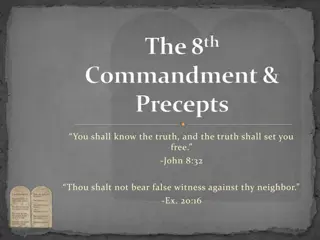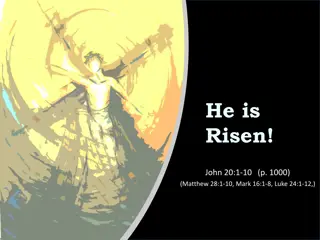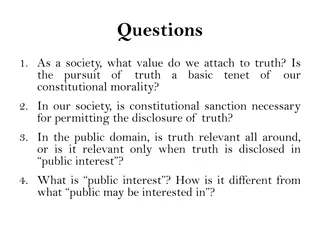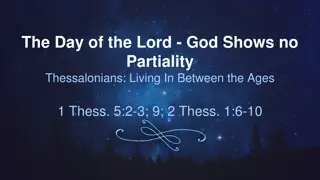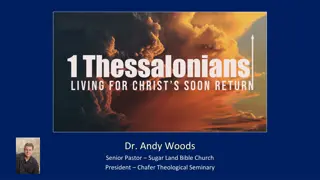
Eternal Perspective and Future Hope in Christian Faith
The Christian faith emphasizes an eternal perspective and a hopeful anticipation of the future, particularly the Second Coming of Jesus. This belief shapes how Christians view the present, infusing it with hope and purpose, free from anxieties and distractions. Understanding the importance of the future provides clarity and focus in daily living.
Uploaded on | 3 Views
Download Presentation

Please find below an Image/Link to download the presentation.
The content on the website is provided AS IS for your information and personal use only. It may not be sold, licensed, or shared on other websites without obtaining consent from the author. If you encounter any issues during the download, it is possible that the publisher has removed the file from their server.
You are allowed to download the files provided on this website for personal or commercial use, subject to the condition that they are used lawfully. All files are the property of their respective owners.
The content on the website is provided AS IS for your information and personal use only. It may not be sold, licensed, or shared on other websites without obtaining consent from the author.
E N D
Presentation Transcript
THESSALONIANS TRUTH I
THESSALONIANS TRUTH: AN ETERNAL PERSPECTIVE.
KONTEKS: everything that surrounds a statement or what is said in the Scriptures and therefore clarify and complete it s meaning.
TWEE MANIERE van VERTALING: LETTERLIKE & DINAMIES EKWIVALENT
Matths 7:6 Moenie wat heilig is, aan die honde gee nie; en gooi julle p rels nie voor die varke nie, sodat hulle dit nie miskien met hulle pote vertrap en omdraai en julle verskeur nie.
Matths 7:6 Moenie wat heilig is vir die honde gooi nie, hulle sal omspring en julle verskeur; en moenie julle p rels voor die varke gooi nie; hulle sal dit met hulle pote vertrap.
The way we conceive the future sculpts the present and gives definition and tone to nearly every action and thought throughout our day-to-day living. If our sense of the future is weak or pessimistic, it reflects in the here and now and affects our behaviour negatively. Much emotional and mental illness and most suicides occur among men and women who feel that they have no future.
The Christian faith has always been characterized by a strong and focused sense of the future, with belief in the Second Coming of Jesus as the most distinctive event. From the day Jesus ascended into heaven, his followers lived in expectancy of his return. He told them he was coming back. They believed he was coming back and they continued to believe it.
For Christians, it is the most important thing to know and believe about the future. The practical effect of this belief is to charge each moment of the present with hope. For if the future will be dominated by the coming again of Jesus, there is little room left on the screen for projecting our anxieties and being busy with irrelevant things. It simply takes the clutter out of our lives.
On the other hand, the belief can be misunderstood so that it results in paralyzing fear for some, laziness in others. Paul s two letters to the Christians in the local church in Thessalonica, among much else, correct any such misconceptions, encouraging us to continue to live forward into the future with joyful expectancy for what God will do next in Jesus.
Though centuries old, Thessalonians was written for times like ours. Nothing has changed. It speaks to a culture filled with seductive images and sexual pressures. It questions the secular values that undermine God s ways. If you ve ever struggled to maintain a pure life in a free-wheeling society, Thessalonians provides an encouraging word: The one who calls you is faithful and he will do it.
Paul wrote to the believers in the church at Thessalonica, founded during his second missionary journey. Riots and opposition had forced him to leave them sooner than he desired. But later news of their progress encouraged Paul to write to them and commend them for growing in the Lord and urge them to correct some misunderstandings. The letters to the church in Thessalonica teaches us a perspective on life that is shaped by eternity.
Pauls two letters to the Thessalonians were written within a few months of each other and are easier to understand than some of Paul s other writings. They were sent by Paul, Silas and Timothy, the team who visited Thessalonica, though clearly Paul is the author.
Although written to the same people at the same place within a short span of time, the two letters are totally different in atmosphere, temperature and tone. They deal with the same subjects, but they do so in entirely different ways.
The city of Thessalonica was situated at the northern side of the Aegean Sea, between Philippi and Berea. At the time of Paul it was a major port, but the harbour has since silted up and the city is now not quite so near the sea. Thessalonica was a key city in the region. It was on the Ignatian Way, the main road from Rome to Asia, and it s port was the terminus of some major north-south trade routes.
The city produced more coinage than any other town around the Aegean Sea, so it was an important financial centre. It was ideal as a location for business and, of course, Paul saw that it could be of strategic importance for the spreading of the gospel. The city had a large and mixed population, including a number of Jewish business traders.
Paul arrived at Thessalonica during his second missionary journey in around AD 49. He had been trying to evangelize first in Asia and then in Bithynia, but each time he had sensed the Holy Spirit preventing him from going to those regions. While they were at Troas (ancient Troy) Paul had a dream of a man beckoning him to come over to Macedonia to help them there.
So they crossed the Aegean Sea, reaching a port called Neapolis. Paul preached in Philippi but was thrown out of the city, so eventually he arrived at Thessalonica.
As was his custom, Paul preached to the Jews in their synagogue. Although he was an apostle to the Gentiles, he had a special responsibility to the Jews. He believed that once they were converted, they would form a church that would reach out to the Gentiles in the neighbourhood.
However, the most fruitful group in the synagogue turned out to be not the Jews but the out-siders who were called God-fearers. These were people who was not Jews by birth, neither had they become Jews nor had they been circumcised, but they were interested in Judaism because they felt that the God of the Jews was the true God.
But this approach and conviction of Paul to minister in the synagogue led to sharp disagreement and conflict in Thessalonica, because some of the Jews then made it impossible for Paul to do any further work there. They were especially angry about Paul s claims that God-fearers could belong to God without becoming Jews.
Commonly referred to as the thirteenth apostle we know more about Paul than any other apostle. He has had more influence on 2000 years of Church History than any other person, except Jesus Himself. A third of the New Testament is either by him or about him.
Pauls original name was Saul, named after Israels first king Paul was his Latin name, used following his conversion. He was born in Tarsus, a city in the north- eastern corner of the Mediterranean, on the coast of what is today south-eastern Turkey.
Paul was brought up with three major influences on his life. First, his parents were Jews, and so from childhood he was taught about God from the Old Testament Scriptures. It would seem that the family moved to Galilee at some point during his childhood and sent the young Paul to Jerusalem to study under a very famous rabbi called Gamaliel.
The second influence on Pauls life was his learning of the Greek language. Living in Tarsus, he spoke Greek, which was the working language of the ancient world. So when, after his conversion, Paul was called to missionary service, he was able to preach and teach anywhere, knowing that he would be understood by all.
Thirdly, Roman law influenced Paul. His father had been made a Roman citizen, also making Paul a citizen by inheritance. This gave him privileges that he sometimes used in his missionary work.
On one occasion he used his citizenship to avoid a pre-trail flogging, and when he was accused of violating the Jewish temple laws he appealed to Caesar, which was the legal right of all Roman citizens.
When he was executed he was not crucified, as Peter was, but was instead beheaded the swift method of execution reserved for citizens. His Roman citizenship did not make Paul s life free from suffering far from it but it was a significant factor at some of the most important moments in his ministry.
On his way to Damascus to persecute Christians, fighting for the purity of his Jewish roots, Paul met with the risen Christ. The conversion was dramatic and traumatic. Paul came to understand that this Jesus was truly the Messiah and that repentance and faith was the only response he could make.
It is fascinating to note that Paul did not immediately start working as a missionary. He started preaching where he was, and very quickly aroused hostility among the Jews. Shortly afterwards he had to be let down secretly in a basket from a window in the city wall in order to escape with his life.
It was to be at least thirteen years before Paul would begin to do what God had called him to do on the day of his conversion. He went to Arabia and spent three years alone with God in silence and solitude, rethinking his theology in the light of his meeting with Jesus Christ alive.
Pauls arrival in Jerusalem to meet the apostles led to great consternation. After all, he had been responsible for imprisoning and even murdering the family members of those whom he was visiting. However, Barnabas was prepared to take the risk of befriending Paul and checking his credentials so that he could be introduced to the local church in Jerusalem.
The Jews in Jerusalem regarded Paul as a traitor: he had been one of their best trainee rabbis, and now he had joined the hated Christians. So he was sent back to Tarsus for ten long years.
Paul had extraordinary qualities of dedication, endurance, enthusiasm and concentration. He could be blunt and fierce, and yet he could also show tremendous love, care and compassion.
There is no doubt that this man absolutely lived for Christ. His life motto could well be summed up by what he said to the Philippians: for to me, to live is Christ and to die gain. From the day when he met Christ on the Damascus road he was totally absorbed with Jesus.
He called himself the slave of Christ. A slave in the ancient world was someone who was despised, totally owned by somebody else, with no spare time and no money. But he also called himself an ambassador for Christ, which is a more impressive image.
He was proud to be an ambassador, and yet also proud to be a slave. His favorite phrase was in Christ , so wherever Paul was in the Roman Empire, his true address was in Christ . Grace, which means receiving what you don t deserve, sums up the way Paul felt.
To the church in Rome he said: while we were still sinners, Christ died for us This grace produced gratitude in Paul, and gratitude is the motivation behind so much of this man s labors.
By any standard, Paul was one of the greatest men who ever lived. From the day that he stood guard over the clothes of the men who stoned Stephen to death to the moment that he could say I am already being poured out as a drink offering and the time of my departure is at hand, God took this man on an incredible journey.
In his final letter he said to Timothy, his son in the faith: I have fought the good fight, I have finished the race, I have kept the faith a race run, a job done and a crown won.
1 Thessalonians 1:1-10 From: Paul, Silas and Timothy. To: The church at Thessalonica in God the Father and the Lord Jesus Christ. May God s amazing grace and peace from the Lord Jesus Christ be with you! We always thank God for you and pray for you constantly.
As we pray, we continually remember before our God and Father your good works produced by faith, your labour prompted by love, and your endurance inspired by hope in our Lord Jesus Christ. For we know, brothers loved by God, that he has chosen you, because our gospel came to you not only with words, but also with power, with the Holy Spirit and with deep conviction.
And you know how our very lives were further proof to you of the truth of our message. In this process you became imitators of us and disciples of the Lord; in spite of severe suffering, you welcomed the message with the joy given by the Holy Spirit.
And so you became an example to all the believers in Macedonia and Achaia your faith in God has become known everywhere. We don t even have to say anything anymore you re the message!
People come up and tell us how you received us with open arms, how you deserted the dead idols of your old life so that you could embrace and serve the only true and living God, while you wait for his Son from heaven, whom he raised from the dead Jesus, who rescues us from the coming wrath.
THESSALONIANS TRUTH I



